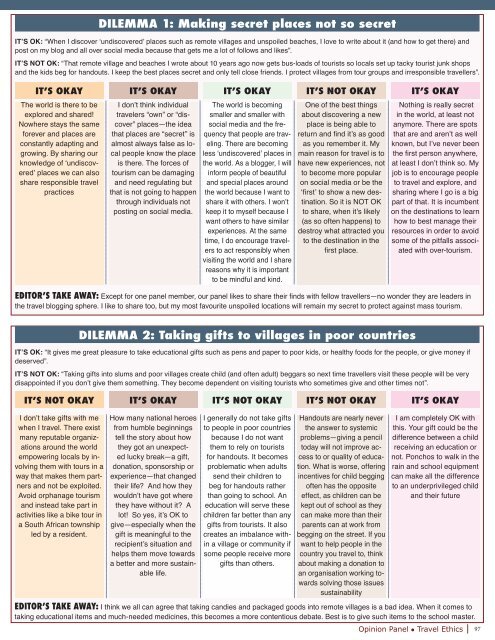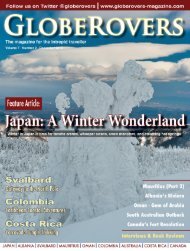Globerovers Magazine, July 2019
GLOBEROVERS MAGAZINE IS NO LONGER ALLOWED TO HAVE MORE THAN 3 ISSUES ON YUMPU UNLESS WE PAY (to provide revenue-generating content to Yumpu!!) SO PLEASE SEE ALL OUR ISSUES FOR FREE ON THESE MAGAZINE PLATFORMS: CALAMEO, MAGZTER, AND ON THE FREE "globerovers" APP. In this 13th issue (July 2019) of Globerovers Magazine, the feature destination is Argentina. We travel from the far north on the border with Bolivia all the way down south to Ushuaia, the gateway to the Antarctic Peninsula. We also have articles about Cyprus and Mauritius Island, Australia, Canada, and we enjoy a colourful New Year Festival with the Naga people in the remote Nagaland region of Myanmar. Photo Essays include the proboscis monkeys and orangutans in Malaysia’s Sabah State on Borneo Island, Peru’s Sacred Valley, and a boat trip down the Li River from Guilin to Yangshuo in China. Furthermore, we have traveller interviews, book reviews, and a lot more! Feedback to editor@globerovers.com. Enjoy!
GLOBEROVERS MAGAZINE IS NO LONGER ALLOWED TO HAVE MORE THAN 3 ISSUES ON YUMPU UNLESS WE PAY (to provide revenue-generating content to Yumpu!!) SO PLEASE SEE ALL OUR ISSUES FOR FREE ON THESE MAGAZINE PLATFORMS: CALAMEO, MAGZTER, AND ON THE FREE "globerovers" APP.
In this 13th issue (July 2019) of Globerovers Magazine, the feature destination is Argentina. We travel from the far north on the border with Bolivia all the way down south to Ushuaia, the gateway to the Antarctic Peninsula.
We also have articles about Cyprus and Mauritius Island, Australia, Canada, and we enjoy a colourful New Year Festival with the Naga people in the remote Nagaland region of Myanmar.
Photo Essays include the proboscis monkeys and orangutans in Malaysia’s Sabah State on Borneo Island, Peru’s Sacred Valley, and a boat trip down the Li River from Guilin to Yangshuo in China.
Furthermore, we have traveller interviews, book reviews, and a lot more!
Feedback to editor@globerovers.com. Enjoy!
You also want an ePaper? Increase the reach of your titles
YUMPU automatically turns print PDFs into web optimized ePapers that Google loves.
DILEMMA 1: Making secret places not so secret<br />
IT’S OK: “When I discover ‘undiscovered’ places such as remote villages and unspoiled beaches, I love to write about it (and how to get there) and<br />
post on my blog and all over social media because that gets me a lot of follows and likes”.<br />
IT’S NOT OK: “That remote village and beaches I wrote about 10 years ago now gets bus-loads of tourists so locals set up tacky tourist junk shops<br />
and the kids beg for handouts. I keep the best places secret and only tell close friends. I protect villages from tour groups and irresponsible travellers”.<br />
IT’S OKAY IT’S OKAY IT’S OKAY IT’S NOT OKAY IT’S OKAY<br />
The world is there to be<br />
explored and shared!<br />
Nowhere stays the same<br />
forever and places are<br />
constantly adapting and<br />
growing. By sharing our<br />
knowledge of ‘undiscovered’<br />
places we can also<br />
share responsible travel<br />
practices<br />
I don’t think individual<br />
travelers “own” or “discover”<br />
places—the idea<br />
that places are “secret” is<br />
almost always false as local<br />
people know the place<br />
is there. The forces of<br />
tourism can be damaging<br />
and need regulating but<br />
that is not going to happen<br />
through individuals not<br />
posting on social media.<br />
The world is becoming<br />
smaller and smaller with<br />
social media and the frequency<br />
that people are traveling.<br />
There are becoming<br />
less ‘undiscovered’ places in<br />
the world. As a blogger, I will<br />
inform people of beautiful<br />
and special places around<br />
the world because I want to<br />
share it with others. I won’t<br />
keep it to myself because I<br />
want others to have similar<br />
experiences. At the same<br />
time, I do encourage travelers<br />
to act responsibly when<br />
visiting the world and I share<br />
reasons why it is important<br />
to be mindful and kind.<br />
One of the best things<br />
about discovering a new<br />
place is being able to<br />
return and find it’s as good<br />
as you remember it. My<br />
main reason for travel is to<br />
have new experiences, not<br />
to become more popular<br />
on social media or be the<br />
‘first’ to show a new destination.<br />
So it is NOT OK<br />
to share, when it’s likely<br />
(as so often happens) to<br />
destroy what attracted you<br />
to the destination in the<br />
first place.<br />
Nothing is really secret<br />
in the world, at least not<br />
anymore. There are spots<br />
that are and aren’t as well<br />
known, but I’ve never been<br />
the first person anywhere,<br />
at least I don’t think so. My<br />
job is to encourage people<br />
to travel and explore, and<br />
sharing where I go is a big<br />
part of that. It is incumbent<br />
on the destinations to learn<br />
how to best manage their<br />
resources in order to avoid<br />
some of the pitfalls associated<br />
with over-tourism.<br />
EDITOR’S TAKE AWAY: Except for one panel member, our panel likes to share their finds with fellow travellers—no wonder they are leaders in<br />
the travel blogging sphere. I like to share too, but my most favourite unspoiled locations will remain my secret to protect against mass tourism.<br />
IT’S OK: “It gives me great pleasure to take educational gifts such as pens and paper to poor kids, or healthy foods for the people, or give money if<br />
deserved”.<br />
IT’S NOT OK: “Taking gifts into slums and poor villages create child (and often adult) beggars so next time travellers visit these people will be very<br />
disappointed if you don’t give them something. They become dependent on visiting tourists who sometimes give and other times not”.<br />
IT’S NOT OKAY IT’S OKAY IT’S NOT OKAY IT’S NOT OKAY IT’S OKAY<br />
I don’t take gifts with me<br />
when I travel. There exist<br />
many reputable organizations<br />
around the world<br />
empowering locals by involving<br />
them with tours in a<br />
way that makes them partners<br />
and not be exploited.<br />
Avoid orphanage tourism<br />
and instead take part in<br />
activities like a bike tour in<br />
a South African township<br />
led by a resident.<br />
DILEMMA 2: Taking gifts to villages in poor countries<br />
How many national heroes<br />
from humble beginnings<br />
tell the story about how<br />
they got an unexpected<br />
lucky break—a gift,<br />
donation, sponsorship or<br />
experience—that changed<br />
their life? And how they<br />
wouldn’t have got where<br />
they have without it? A<br />
lot! So yes, it’s OK to<br />
give—especially when the<br />
gift is meaningful to the<br />
recipient’s situation and<br />
helps them move towards<br />
a better and more sustainable<br />
life.<br />
I generally do not take gifts<br />
to people in poor countries<br />
because I do not want<br />
them to rely on tourists<br />
for handouts. It becomes<br />
problematic when adults<br />
send their children to<br />
beg for handouts rather<br />
than going to school. An<br />
education will serve these<br />
children far better than any<br />
gifts from tourists. It also<br />
creates an imbalance within<br />
a village or community if<br />
some people receive more<br />
gifts than others.<br />
Handouts are nearly never<br />
the answer to systemic<br />
problems—giving a pencil<br />
today will not improve access<br />
to or quality of education.<br />
What is worse, offering<br />
incentives for child begging<br />
often has the opposite<br />
effect, as children can be<br />
kept out of school as they<br />
can make more than their<br />
parents can at work from<br />
begging on the street. If you<br />
want to help people in the<br />
country you travel to, think<br />
about making a donation to<br />
an organisation working towards<br />
solving those issues<br />
sustainability<br />
I am completely OK with<br />
this. Your gift could be the<br />
difference between a child<br />
receiving an education or<br />
not. Ponchos to walk in the<br />
rain and school equipment<br />
can make all the difference<br />
to an underprivileged child<br />
and their future<br />
EDITOR’S TAKE AWAY: I think we all can agree that taking candies and packaged goods into remote villages is a bad idea. When it comes to<br />
taking educational items and much-needed medicines, this becomes a more contentious debate. Best is to give such items to the school master.<br />
Opinion Panel • Travel Ethics | 97





